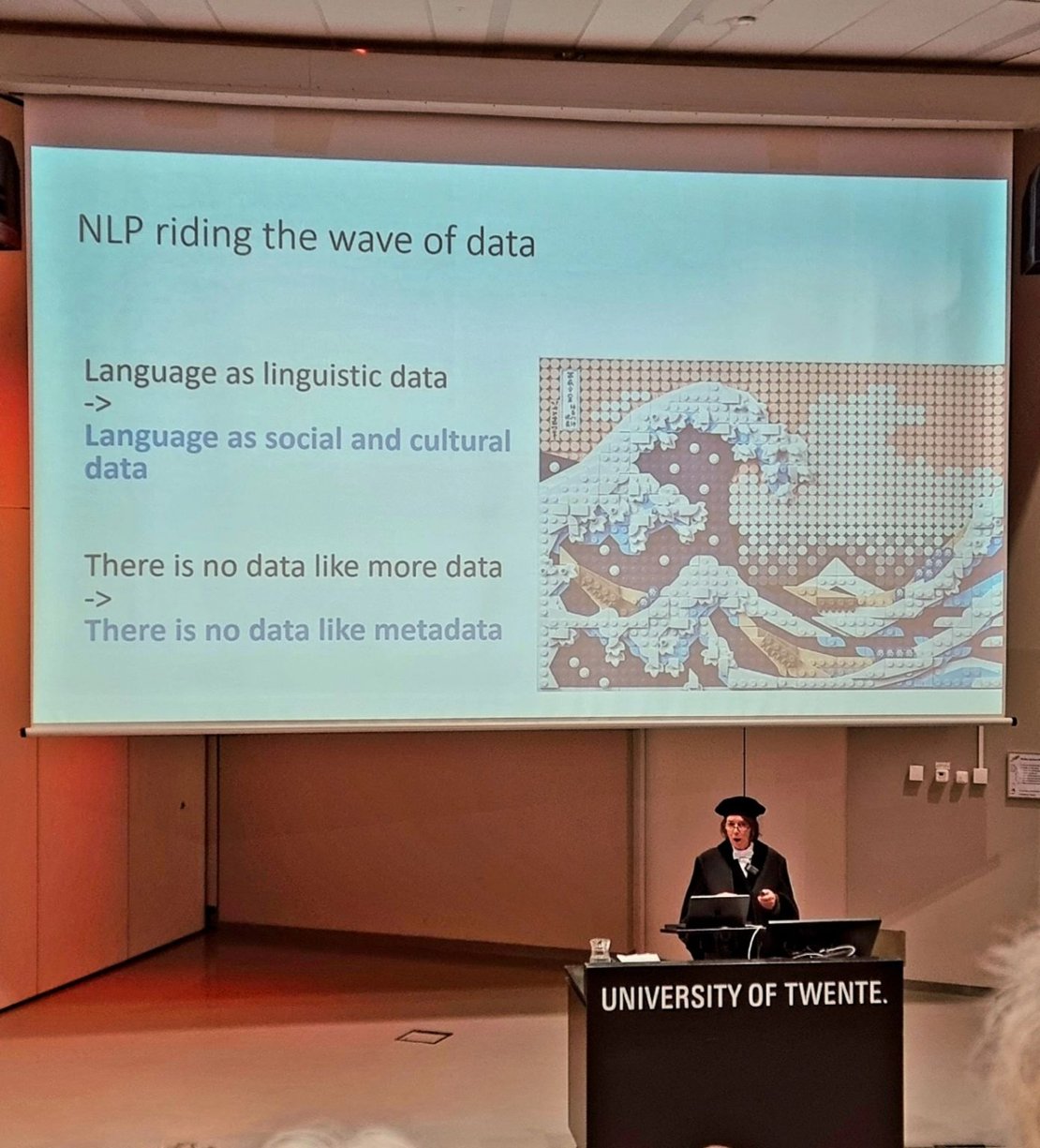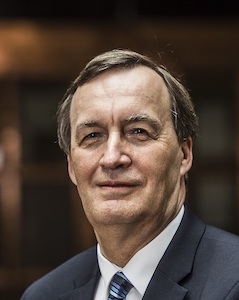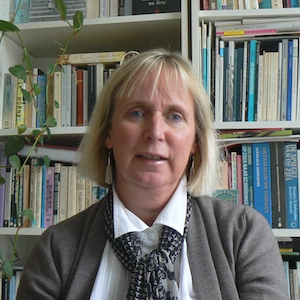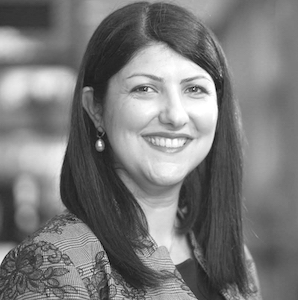Farewell Symposium: "Crossroads and Detours"
The symposium was held prior to the farewell lecture of Franciska de Jong on the 24th of November 2023.

Programme
Date: 24 November 2023
Time: 13:30 - 15:30
Location: Waaier 2, University of Twente
The symposium will be chaired by Prof.dr. Dirk Heylen.
The following speakers have been confirmed:
13:30 - 14:00
Language Technology Research Serving the SSH domain: Access to Oral History Archives
by Jan Hajic, Charles University, Prague (Czechia)
Abstract Digital Humanities cover a very broad range of disciplines, and also vary in terms of support technologies used in research and education. While digitization of resources is essential, there are also advanced technologies in the areas of large data processing, language technology, computer vision and more recently, artificial intelligence and deep learning. In the talk, methods for searching and accessing large multilingual digital archives will be presented, from the first attempts to recognize speech, to machine translation of transcripts and thesauri to advanced search methods that can pinpoint segments of the video and audio recordings with accuracy that even transcription cannot provide. The turn-of-the-millenium seminal U.S.-EU project Malach will be briefly described, together with the evolution of both the technology and its application to enrichment of large oral history archives since then. An example will be shown of the integration of such technologies at the Center for Visual History Malach, which is part of the Czech node of the EU’s CLARIN Research Infrastructure network and which provides access to several oral history archives – from USC’s Visual History Archive to UK’s Refugee Voices, to more recent interviews collected in Serbia.
Bio Jan Hajič is a full professor of Computational Linguistics at the Institute of Formal and Applied Linguistics at the School of Computer Science, Charles University, Prague. He is the vice-director of the Institute. His interests span morphology and part-of-speech tagging of inflective languages, machine translation, deep language understanding, and the application of statistical machine learning in NLP. He also has an extensive experience in building language resources for multiple languages with rich linguistic annotation, and is currently also the director of a large, multi-institutional research infrastructure on language resources in the Czech Republic, LINDAT/CLARIAH-CZ. His work experience includes both industrial research (IBM Research Yorktown Heights, in 1991-1993) and academia (Charles University in Prague, Johns Hopkins University, University of Colorado, and the Centre for Advanced Studies at the Norway Academy of Sciences, and others). He is the chair of the Transactions of the ACL Steering Committee and he is the chair of the Executive Board of META-NET, the European research network in Language Technology.

14:00 - 14:30
40 Years of Language & Speech Technology in the Netherlands and Beyond
by Alice Dijkstra, NWO (The Netherlands)
Abstract The presentation will feature some personal highlights in the developments in Human Language Technology (HLT) I have enjoyed watching: first from a research perspective and later from a policy and funding perspective. It will meander past cities, projects and people, in the Netherlands, Flanders and beyond. It will end with the person with whom for me it all began and about whom the history of his role in the early days of language technology should be written. I hope Franciska will write that history now that she supposedly has more time.
Bio I am senior programme officer at the Netherlands Organisation of Scientific Research (NWO) responsible for the coordination of the Dutch National Roadmap for Large Research Infrastructures and its funding competitions. In addition I coordinate the NWO policy for research infrastructures in the social sciences and humanities (SSH), and the international SSH policy and implementation. I was involved in setting up several big multi-stakeholder research programmes on Language and Speech Technology, Dyslexia, Cognitive Science, Language Acquisition & Multilingualism, Access to Cultural Heritage, Comprehensible Language & Effective Communication and I coordinated the Dutch-Flemish HLT research and infrastructure programmes. Strengthening the research infrastructure for social sciences and humanities is a core mission for me that I pursue in several international capacities: ESFRI Strategic Working Group Social and Cultural Innovation; Governing Board of the CLARIN ERIC (president); Governing Board of the DARIAH ERIC (vice chair) and in advising other SSH Research Infrastructures.

14:30 - 15:00
From University to Parliament, and Back
by Maral Dadvar, Goethe University, Frankfurt am Main (Germany)
Abstract Not all scientists are cut out for, or interested in, academic life and the confines of universities. On the other hand, the main perceived alternative for a PhD graduate is usually limited to industry. In this talk, I would like to explore alternative paths - ones that are typically not considered by scientists. I will share my experience as a scientist who started on the conventional research path, but along the way discovered other exciting options never encountered before. I will talk about how the Global Young Academy opened new doors for me and led me to become an advisor to the European Commission's Scientific Advice Mechanism on the further involvement of early career researchers in science policy. When I was doing my PhD on cyberbullying at the UT, I could never have imagined that I would be invited to the state parliament to give a speech on open science and digitalisation strategy. I will be highlighting the role that universities and research institutes should play in familiarising scientists with the other options that a researcher can pursue, rather than saturated academic titles.
Bio Dr. Maral Dadvar is a computer scientist specializing in Natural Language Processing, specifically in the areas of information retrieval and analysis on online social platforms. She also has a keen interest in utilizing Linked Open Data for developing domain-specific knowledge graphs. She earned her PhD from the Human Media Interaction group at the University of Twente, with Franciska de Jong in 2014. A few years later, she was elected as a member of the Global Young Academy, expanding her involvement in science policy, open science, and diversity, and efforts promoting diversity and inclusivity in the scientific community. She co-founded and served as a board member of the Young Academies Science Advice Structure (YASAS), which is part of the European Commission's Scientific Advice Mechanism, facilitating the involvement of early career researchers in science policy initiatives. Over the past few years, Dr. Dadvar has focused on project management and scientific coordination, overseeing various national and international research projects. Currently based at Goethe University, Frankfurt, Germany, Dr Dadvar is the project manager of the ARENA Research Unit.

15:00 - 15:30
How NLP Became a Tool of Villains, and How to Get the Genie Back into the Bottle
by Djoerd Hiemstra, Radboud University, Nijmegen (The Netherlands)
Abstract In this presentation, I will look back at first half of the 1990's reflecting on my first encounters with Natural Language Processing (NLP) when I followed the courses Computer Science and Language (Informatica en Taal) and Language Technology (Taaltechnologie) at the University of Twente. I remember that time as a really exciting period. Statistical approaches were outperforming symbolic approaches in every conceivable NLP application, including those that were traditionally considered as knowledge-intensive, such as Machine Translation. Just like then in the 1990's, we are witnessing a turning point in NLP now that deep learning is consistently outperforming those early statistical approaches. However, there is also a dark side to today's deep learning approaches. Large language models need a lot of compute resources, they amplify biases that are present in the data, and they are used to spread misinformation and manipulate people on a large scale. I realize now, looking back, that warnings for those dark sides were already present in the courses I followed, and the papers I read. My presentation will repeat those warnings and I hope they are not in vain this time.
Bio Djoerd Hiemstra published an often cited PhD thesis "Using Language Models for Information Retrieval" in 2001 under supervision of Franciska de Jong. Since then, Djoerd contributed to several open source search engine prototypes, including PuppyIR, PF/Tijah, MIREX, and OpenWebSearch.eu. In 2019 Djoerd was appointed professor at the data science group of Radboud University in Nijmegen, where he gets a chance to research technology that may replace Big Tech in the future, such as open standards for information retrieval and federated search.

Registration for the symposium
Please register for the symposium by following this link.
Farewell lecture
After the symposium, Franciska de Jong will give her farewell lecture at 16:00 (in Waaier 2), followed by a reception. We kindly ask you to register for the farewell lecture and reception via this link: https://ut.onl/inaugural-farewell-lectures.
.
